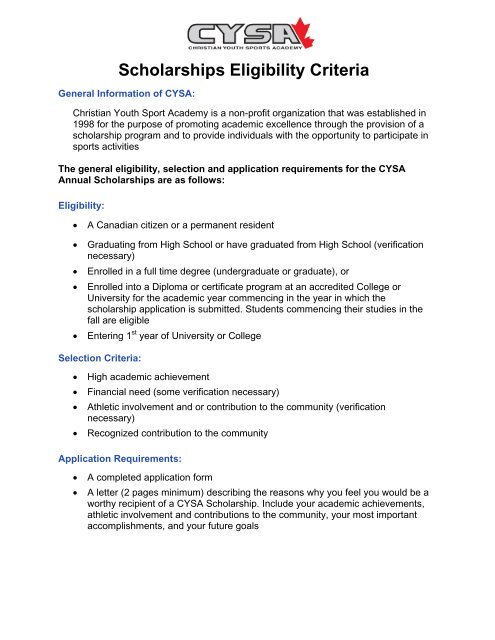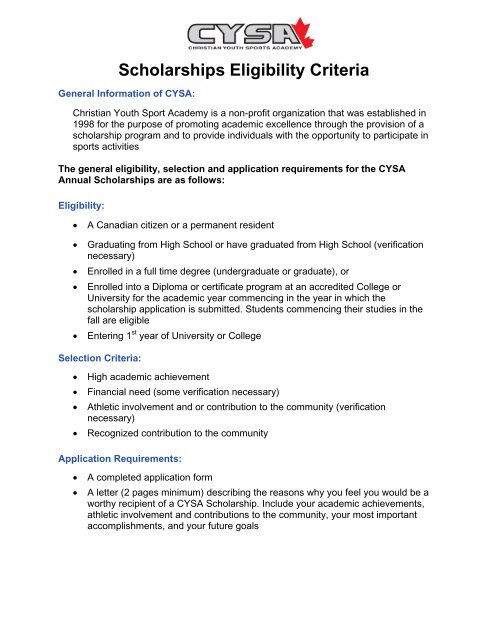My Scholarship Quest: Unlocking Eligibility Secrets (A Story for Every Aspiring Student)
Hey there! Let me tell you a story. Not just any story, but my story about scholarships. I remember staring at my computer screen, feeling completely overwhelmed. "Scholarships," I thought, "that’s for the super-smart, the perfect-GPA kids, right?" My heart would sink a little every time I saw those words. I wanted to study, to learn, but the cost? It felt like a giant, insurmountable wall.
If you’re reading this, chances are you’re feeling a bit like I did back then. You dream of getting a scholarship, but the whole "eligibility" thing feels like a secret code only a few people know. Well, guess what? It’s not! And I’m here to tell you, from my own experience, how I started to decode it.
What Even Is Scholarship Eligibility, Anyway?
Before I dive into the nitty-gritty, let’s simplify. When a university, an organization, or even a generous individual offers a scholarship, they usually have a specific kind of student in mind. "Eligibility" just means the set of conditions or requirements you need to meet to be considered for that scholarship. Think of it like a checklist. You tick enough boxes, and you’re in the running!
My first mistake was thinking it was only about grades. Oh, how wrong I was! Through countless hours of research, a few rejections, and finally, some glorious acceptances, I learned that eligibility is a multi-faceted thing. It’s like a puzzle with several pieces.
Let’s break down those pieces, one by one, based on what I discovered.
1. Academics: It’s More Than Just a Number
Alright, let’s get this one out of the way first, because it’s often the most intimidating. Yes, your grades and academic performance do matter. Many scholarships, especially those based on "merit," will look at your:
- GPA (Grade Point Average): This is your overall academic score. Some scholarships might ask for a minimum GPA (e.g., 3.0 out of 4.0). My grades were decent, but I thought they weren’t "perfect." What I learned was, sometimes "decent" is enough, especially if other parts of your application shine.
- Test Scores (SAT/ACT, GRE/GMAT, IELTS/TOEFL): If you’re applying for university, these standardized test scores might be part of the requirement. For international students, English proficiency tests like IELTS or TOEFL are almost always a must. Don’t just aim for the minimum; try to do your best!
- Coursework: Did you take challenging classes? Did you excel in subjects related to your desired major? This shows dedication and a genuine interest.
My takeaway: Don’t let a less-than-perfect GPA scare you off from all scholarships. Some prioritize other aspects, and even for academic ones, showing improvement or excelling in specific subjects can be a huge plus. Always read the fine print on the academic requirements.
2. Financial Need: Don’t Be Afraid to Show Your Hand
This one was a biggie for me, and for many students. "Need-based scholarships" are designed to help students who genuinely can’t afford the full cost of tuition and living expenses. They’re not about your grades; they’re about your financial situation.
To assess this, scholarship providers often ask for:
- Income Statements: This could be from your parents or guardians, or your own if you’re independent.
- Tax Returns: Proof of income and financial status.
- Assets: Information about any savings, property, or investments.
- FAFSA (Free Application for Federal Student Aid) / CSS Profile: These are common forms, especially in the US, that universities and organizations use to determine your Expected Family Contribution (EFC). If you’re applying internationally, check what forms or documents they require to assess your need.
My takeaway: It felt a bit invasive to share all my family’s financial details, but it was absolutely necessary for need-based scholarships. Don’t assume your family isn’t "needy enough." Apply anyway! You never know until you try, and often, the calculation of "need" is more complex than just looking at a bank balance.
3. Beyond the Books: Your Extracurricular Story
This is where I really started to shine, and where many students underestimate their potential. Scholarships aren’t just looking for robots who only study. They want well-rounded individuals who contribute to their communities.
Think about:
- Clubs and Organizations: Were you part of a debate club, a science fair team, or a drama group?
- Volunteer Work: Did you help at a local shelter, organize a clean-up, or tutor younger kids?
- Leadership Roles: Did you lead a project, captain a sports team, or serve on a student council?
- Work Experience: Even a part-time job shows responsibility, time management, and a good work ethic.
- Hobbies and Talents: Are you an amazing musician? A budding artist? A competitive gamer? Sometimes, scholarships exist for specific talents!
My takeaway: Don’t just list what you did; explain what you learned and what impact you made. For example, instead of "Member of Debate Club," try "Debate Club Secretary, where I organized weekly meetings and mentored junior members, leading our team to regional finals." See the difference? It shows leadership and impact, not just participation.
4. The Power of Your Voice: Crafting That Essay
Oh, the essay! This one used to make my palms sweat. But it’s also your golden opportunity to speak directly to the scholarship committee. It’s your chance to show them who you are beyond the numbers.
Most scholarship essays ask for:
- Why you deserve the scholarship: What makes you a unique candidate?
- Your goals and aspirations: What do you plan to do with your education? How will this scholarship help you achieve that?
- Overcoming challenges: Did you face any obstacles and how did you overcome them?
- Your passions: What truly excites you?
My takeaway: Don’t just rehash your resume. Tell a story. Be authentic. Let your personality shine through. I wrote about how my love for nature led me to pursue environmental science, even though I grew up in a big city. It wasn’t perfect, but it was my story, and it connected with the committee. Get someone else to read it over for clarity and grammar!
5. Those Golden Tickets: Letters of Recommendation
Imagine someone important vouching for you. That’s what a letter of recommendation does. These are letters written by teachers, counselors, employers, or mentors who know you well and can speak to your character, abilities, and potential.
My takeaway: Choose people who genuinely know you and can write specific examples of your strengths. Don’t just pick the teacher who gave you an A. Pick the one who saw you struggle and succeed, or who witnessed your leadership in action. Always ask politely, give them plenty of notice, and provide them with information about the scholarship and your goals to help them write a strong letter.
6. The Niche Stuff: Specific Criteria That Might Surprise You
This is where the real digging comes in, and where many people miss out. Besides the general eligibility criteria, many scholarships have very specific requirements. These can include:
- Your Major/Field of Study: Scholarships for STEM fields, arts, education, etc.
- Your Demographics: Scholarships for specific ethnic groups, first-generation college students, single parents, etc.
- Your Location/Citizenship: Scholarships for residents of a certain city/state, or for international students from specific countries.
- Your Affiliations: Scholarships for children of employees of a certain company, members of a specific club or organization, or even descendants of military veterans.
- Unique Talents: For athletes, artists, musicians, debaters.
My takeaway: This is why reading every single word of the scholarship description is crucial. I found a scholarship specifically for students interested in sustainable agriculture – something I hadn’t even thought to look for, but it fit my interests perfectly!
7. The Interview (Sometimes!): Be Ready to Talk
For some competitive scholarships, after you’ve made it through the initial application, they might invite you for an interview. This is your chance to really connect and show them your passion and personality in person (or via video call!).
My takeaway: Prepare! Research the organization, think about common interview questions ("Why do you want this scholarship?", "What are your strengths/weaknesses?", "Where do you see yourself in five years?"), and practice your answers. Be yourself, be confident, and let your enthusiasm show.
My Top Tips for Navigating the Eligibility Maze
After all my ups and downs, here are the absolute golden rules I wish I’d known from day one:
- Read Everything, Twice: Seriously. Every word of the eligibility requirements. Don’t assume. A tiny detail you miss could cost you.
- Start Early: Scholarship applications take time. Gathering documents, writing essays, getting recommendations – it all adds up. Give yourself ample time.
- Create a System: Keep a spreadsheet. List the scholarship name, deadline, eligibility criteria, documents needed, and status. It keeps you sane!
- Tailor Each Application: Don’t use a generic essay for every scholarship. Tweak your essay and highlight aspects of your experience that align with that specific scholarship’s mission.
- Don’t Self-Reject: This is HUGE. My biggest mistake initially was thinking I wasn’t "good enough." Apply even if you think you only meet 80% of the criteria. You never know who else is applying or what they’re looking for.
- Seek Feedback: Ask a teacher, mentor, or even a trusted friend to review your essays and application materials. A fresh pair of eyes can spot errors or suggest improvements.
- Be Persistent: You will face rejections. It’s part of the process. Don’t let it get you down. Learn from it, adjust, and keep applying!
The Finish Line (Or, Just the Beginning!)
Looking back, my scholarship journey was a bit of a rollercoaster. There were moments of pure frustration and moments of exhilarating hope. But every step taught me something valuable about myself, about my goals, and about how to navigate the system.
Scholarship eligibility isn’t a secret society. It’s a set of guidelines designed to help scholarship providers find the right students for their funds. By understanding these criteria – academics, financial need, extracurriculars, essays, recommendations, and specific requirements – you empower yourself to craft an application that truly stands out.
So, what’s the big takeaway? Don’t be afraid to put yourself out there. Do your research, be honest, showcase your unique story, and never, ever give up. Your dream of higher education is within reach, and with a little persistence and understanding, you can unlock those scholarship doors just like I did.
Now, go forth and start your own scholarship quest! You’ve got this.



